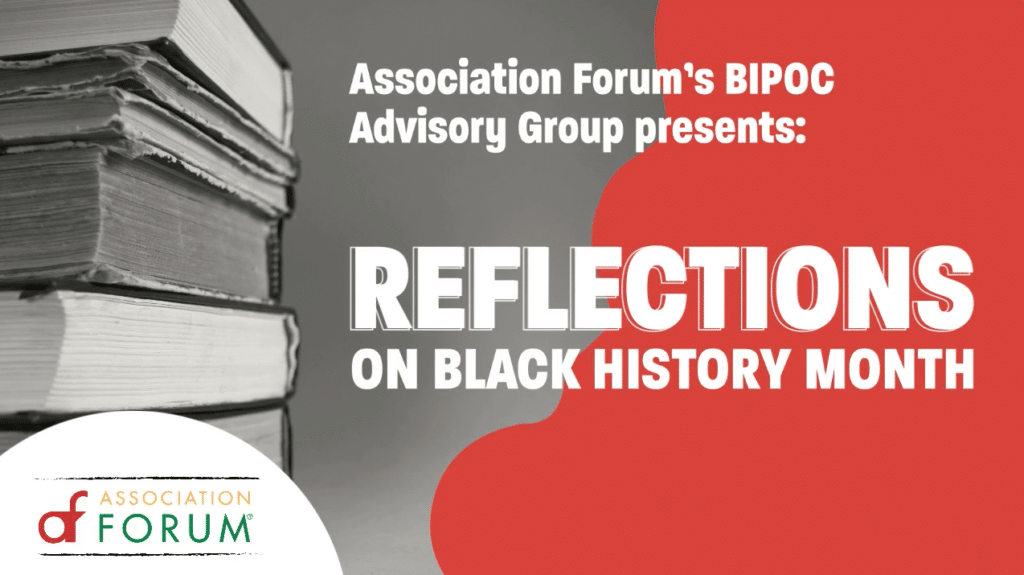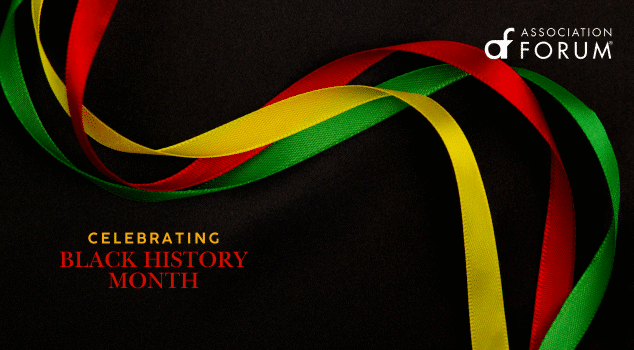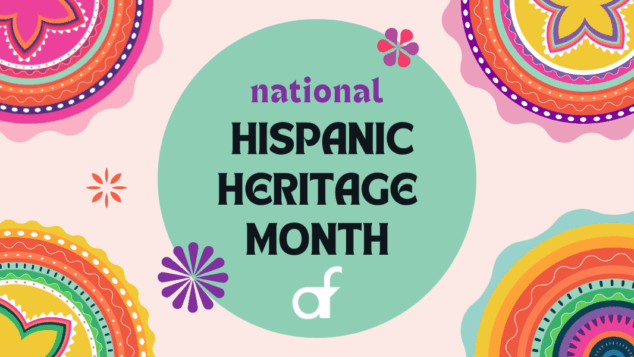Reflections on Black History Month: Jacqualine Price Osafo

This video is the first in a series for Black History Month. Organized by Association Forum’s BIPOC Advisory Group, this series asks black association leaders to reflect on this month and their role in making history within our industry. In this video, Artesha Moore, President & CEO of Association Forum, sits down with Jacqualine Price Osafo, the first person of color to hold the executive director office at the Society of American Archivists. If you prefer to read the transcript, scroll down for the full text.
Video Transcript
Artesha Moore: Hi. I’m Artesha Moore. I’m the president and CEO of Association Forum. And today, I’m here to introduce Jackie Price Osafo. Jackie, before we start, I’d like to turn it over to you to introduce yourself.
Jacqualine Price Osafo: Well, first of all, Artesha, congratulations. Congratulations. I’m super proud that you have decided to join us in Chicago and take the helm of the Association Form. So, we are very, very happy that you’ll be serving in that space and super excited for you. So, no doubt.
Once again, I’m Jackie Price Osafo, and I am the executive director for the Society of American Archivists.
Artesha Moore: Well, thank you for being with us today. What I’d like to start with is what is it like to be the first person of color for your organization?
Jacqualine Price Osafo: I’m going to take a deep breath because I think being the first is not something you set out to be, but it is something that we know is very common when you look at women and underrepresented populations. For me, it’s gratitude, at the end of the day. It’s gratitude in a way that so many people had to do so many amazing things in order for me to walk through the door. Today, while I was getting dressed, I decided to wear this particular necklace here. And it is a little piece of glass inside this necklace here. And it was given to me by a previous executive director, who is a mentor, a friend, a colleague, [Pauli Undesser 00:01:46], who is the executive director for the Water Quality Association. And it came with a little note that says that, “Glass ceilings are broken mostly by folks who sit in underrepresented populations.”
And when she gave me this necklace, it made me cry. I was just like, “Wow.” I was breathtaking. It was breathtaking for me. And along with it being a breathtaking experience, there is a huge responsibility that you must carry on your shoulders. And that’s fine because I feel like so many before me have done that. So, I’m okay doing that. But you have to care for everyone, not just the people who look like you, but the people who don’t look like you, the people who are very different from you in so many aspects. And that’s something that I’ve been doing all of my life. That part is not difficult for me. But yes, was it a moment of whew, I need to breathe? Yes. But has it been an amazing experience? Yes. It’s been made possible by so many people, and many of them are very different from me. So, I’m thankful for the community who created a space for me to walk through the door, to break a glass ceiling.
Artesha Moore: I think that’s really powerful. And especially when you say about the community that made this as possible in that struggle for us. And then, for me, you’ve been so inspiring for my career. So, to watch you in this position inspire so many others is, for me, I’m also grateful because of the folks that will come after you. As we look at this in this recording of two strong African-American female leaders, I’d like to ask you from a reflection standpoint, what does Black History Month mean to you?
Jacqualine Price Osafo: When I think about black history and I think about my heroes, my sister shared a story with me as a grownup. This was maybe a year or so ago. And she said, “Jackie, do you remember when we were kids, and I was asked, who’s my hero? And I told my teacher, it was my father.” And the teacher told her, “No, it has to be someone else.” She said, “No, it is my father.” And she stuck with that. And Artesha, my heroes are people that you don’t know. They’re all people I know. So, when I think about black history, I think about my grandmother. I think about the picture that sits on my kitchen countertop with my great-grandmother and my grandmother, who is a teenager who was standing there tall and strong and had to endure so much.
I think about her sister who died in a fire that could have been prevented. I think about my own parents too, basically migrated from the south. They were the first to leave their families from the south. And because my father decided that he did not want his kids to experience what he experienced growing up in the south. And here are these two young people with three little kids moving to Chicago with nothing. And here we are today. When I think about Black History Month, I think about the people that probably only I know and only my family knows. Those are the people who I hold close to me, who I am obligated to do what I do and keep contributing to this world. So, that’s what it means to me, the struggle.
Artesha Moore: Yeah. I think in some aspect, you touched on my last question about your heroes. So, I’m going to take this chance to do an audible and ask a question about, in carrying that legacy and heroes with you, how does it show up in your leadership daily?
Jacqualine Price Osafo: My mom shows up in almost everything that I do. Her voice is in my head. I can’t shake, [Katie 00:06:08]. Katie is… And both my parents have passed away. And I’m lucky to say that I had two amazing parents. I am so lucky to say that. And Katie shows up in a way that Jackie, when you’re having a tough day, suck it up, soldier, go to the bathroom, wash your face, and come back out, and do it again. She shows up in a way where if you want to ask a question or if you want something, ask for it, because you will not die if someone says, “No.” And Artesha, in 90% of my life, people have said, “Yes,” to me.
Isaac, my father, shows up in the calmness, in the moments when a leader, you need to be very calm and you need to breathe everything in and everybody in, and you need to wrap your hands around the family. That’s my father showing up. He was the one, as growing up, everything was a family meeting. I’m like, “Can we just buy some Cheerios without having a family meeting?” Everything was a family meeting. So, how do I become this inclusive person? How did I understand that it takes a difference of all these people and growing up in the house with a disabled sibling? Was my father. Katie and Isaac, ying yang. Some days it’s 50 Katie, some days, it’s 60 Katie. Some days, it’s 60, 70 Isaac. So, they show up in every single thing that I do.
And I’m grateful. I’m grateful. I really wish that most people or a lot of people have that same experience and can find folks in their lives who show up for them. And in return, being a child-free person, I’m doing the same thing for my niece and nephews. I’m showing up for them. My goal is to be the favorite auntie. If that means buying candy, or ordering them something goofy on Amazon, or my niece, who was having a baby, need to gain weight, I said, “Every pound you gain, Auntie Jackie will give you $10.” She’s like, “Okay.” Whatever I need to do to make them amazing people, that’s me giving back.
Artesha Moore: I appreciate that. And this timeframe to hear from you, I think one of the things that I’ve always loved about you is your authenticity and how inspiring it is to hear that that is threaded from your family and your legacy. And that’s how it shows up. So, I’m grateful for your parents, and your history, and the folks that brought you here so that you can continue to inspire us all. Thank you, Jackie, so much.
Jacqualine Price Osafo: Thank you. And it’s been an amazing journey.
Tags
Related Articles
BAE Chicagoland Kicks Off: Join the Movement!
Black Association Executives (BAE) is officially in Chicagoland, bringing a bold new community to Black...
25/7/365 Leadership: How to gain an extra hour every day (Without burning out)
Association professionals don’t work in a 9‑to‑5 world, but in a 24/7/365 reality. With high...
Celebrating Hispanic Heritage Month with Association Latinos
How to celebrate Hispanic Heritage Month within the association community and Chicago!





